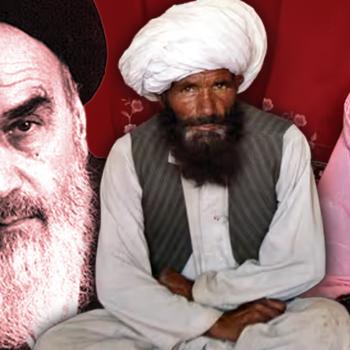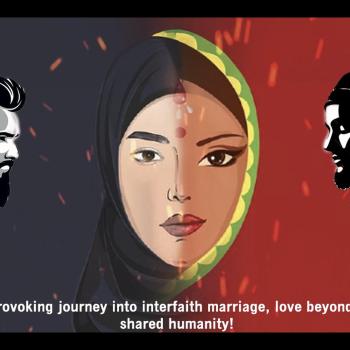Just in time for Halloween, the Toronto Star‘s ethics columnist, Ken Gallinger (whose columns I enjoy), received a question from a parent:
We are a Christian family. Our daughter, 7, goes to a school where there are many Muslim kids. Some of their moms walk them to school in burqas. My daughter is fascinated by these mysterious “costumes” and says she wants to go out on Halloween as a “Muslim lady.” Do I let her?

Gallinger’s first remark (“Absolutely not”) and his concluding paragraph (which I’ll get to) aren’t bad. Cultural appropriation via Halloween costumes seems to be a yearly thing, which we’ve touched on before on MMW,* and is never okay, so I’m glad that Gallinger was so forceful in his initial statement.
But the reasoning is off. Gallinger begins by saying that, “In the first place, the Muslim community in Canada is conflicted, within itself, about the place of the burqa in religious life.” This is an interesting point, and it’s definitely good to point out that the Muslim community isn’t monolithic, but it’s not exactly relevant here.
Wearing a burqa as a Halloween costume is wrong because of issues of cultural appropriation (which is problematic no matter how well-intentioned the young would-be burqa wearer), not because the Muslim community doesn’t have one unified stance on this. Gallinger continues:
At one extreme are those, of both genders, who see wearing these garments as a matter of religious devotion, even obligation, for Muslim women. At the other, many see them as signs of the oppression of women, and therefore offensive in a progressive society like ours.
In other words, Muslims can be divided into the bad ones and the good ones. If Gallinger had wanted to portray this dichotomy as neutral in any way, the “progressive society like ours” part wouldn’t have been there. We can gather from this that “our” society approves of some Muslims, but not others. On the good side, our society is also apparently free of systemic oppression of women!
Gallinger also drastically simplifies the debate; there are many stances in the middle of these poles (where people might not believe these garments to be obligatory but don’t necessarily condemn women who wear them.)
He continues to pretend to be nuanced in his consideration of the two sides of this debate:
These are complicated questions. Even those women who claim they have “chosen” to wear the burqa sometimes testify that, although it was their “free” choice, choosing not to wear it could result in trouble — either at home or in their community. One wonders, therefore, whether a choice made under those conditions is really in any sense free.
In other words, maybe it’s a choice–oh, no, never mind, probably not. Because most other choices are made without any conditions whatsoever, right? I’ve written about this whole “choice” discussion before; the point isn’t that the burqa is always freely chosen, but that the whole idea of choice is way more complicated than usually comes across. Comments like those in this column reinforce the idea that Muslim men and communities are generally oppressive and sexist, and the Muslim women never act on their own behalf, and leave completely unexamined the social constraints on other “choices” that any of us may make.
Gallinger again divides Muslims into two separate categories (this time, the ones who do and don’t celebrate Halloween), and then writes that:
Allowing your daughter to dress this way, therefore, is to inject her into the middle of not just one, but two controversies. Not only is that unfair to her, but disrespectful of your Muslim neighbours. I would hope that if your next-door neighbours were having an internal family argument, you wouldn’t knowingly send your kid into the middle of it. Same reasoning applies here.
I really do appreciate his emphasis on the need for respect, and on the importance of staying out of conversations that are most effective when internal to the Muslim community. But I still feel like he’s missing the point.
Letting the kid dress up “like a Muslim” for Halloween isn’t offensive because of the internal debates about it within the Muslim community; it would be just as offensive even if Muslims were in agreement about the burqa. It is, however, offensive in the ways that religious identity gets objectified, commodified, and appropriated.
And this is a point that Gallinger gets to in his conclusion. He argues that:
There will be people who read this and accuse me, as they so often accuse liberal media-types, of Islamophobia, i.e. being scared of Muslims and therefore affording them more respect than we give to Christians. “After all,” they will say, “kids have dressed up as priests and nuns for years on Halloween, and no one said Boo.” True enough — but isn’t it different if Rick Mercer or Mary Walsh teases Newfoundlanders about their unique ways than if a Torontonian calls them Newfies and makes fun of them?** Some things that are appropriate inside a family feel different when they come from outside. If a black kid wants to dress up as Jackie Robinson then go for it — but I’m not sure a white kid should put on blackface makeup to do it.
Although I wish Gallinger had dealt more directly with issues of power and representation, this is a much better explanation than the earlier part of his article for why the kid shouldn’t wear a burqa as a Halloween costume. It’s not about conflicts within the “family” (it’s not like there’s debate over whether Jackie Robinson’s skin is or should be a certain color), but some things are just offensive when some people wear them. I just wish that the column had focused on this, rather than taking all its detours about bad oppressive Muslims.
* Just a note, for the record, that the commenter named “Krista” on that link is not me!
** For non-Canadians: Newfoundland is a province on Canada’s East Coast that is often the target of “jokes” that portray its inhabitants as small-minded and unintelligent. Rick Mercer and Mary Walsh are two well-known comedians who are originally from Newfoundland.















